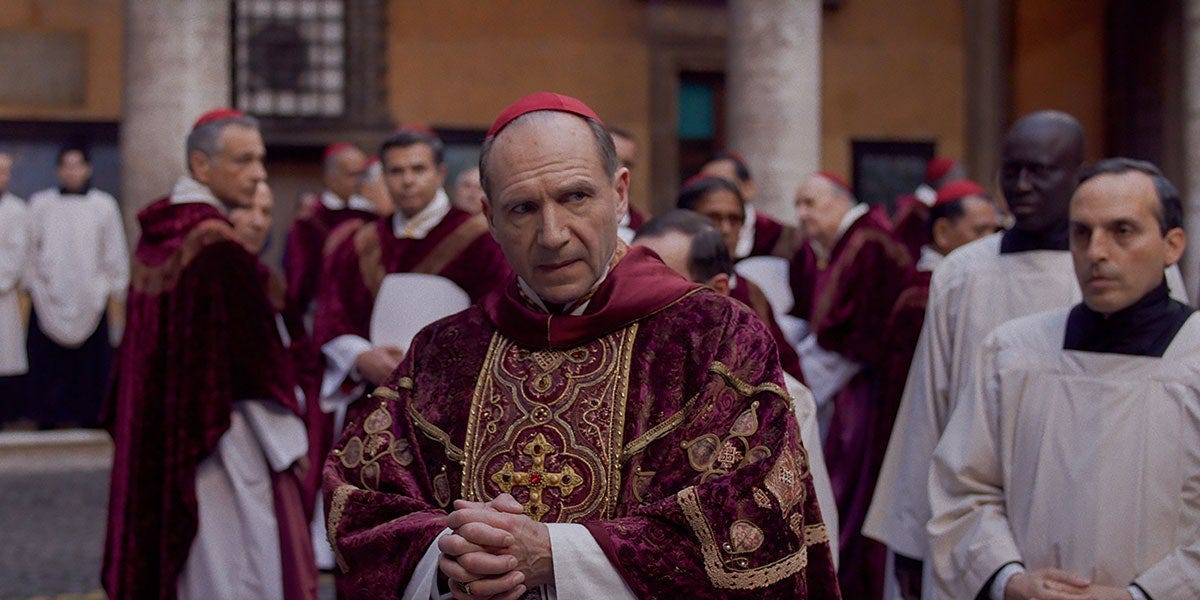Reviews: 'Conclave,' 'Heretic,' and 'Christmas Eve in Miller's Point'
Short reviews of 2 religious mediocrities and a new holiday classic
Conclave
Edward Berger’s Conclave is little more than a filmed screenplay, a prestige picture that is pleasurable enough to watch yet utterly forgettable.
Each element of the movie that works- its gorgeous, shadowy cinematography, pleasingly erratic score, regal performances with hints of mischief- often exists independently of one another.
Structured around a secretive gathering in Vatican City to select a new pope, Conclave is more concerned with the political machinations of the papacy than with any discernable spirituality. The cardinals vote in the open, but plot in secret between casting their ballots.
Pulling most of the levers is Cardinal-Dean Lawrence (Ralph Fiennes), who oversees the secluded event. Among those vying to be the next pope are a buttoned-up progressive candidate (Stanley Tucci), a corrupt centrist (John Lithgow), a hard-line conservative who vapes (Sergio Castellitto), and another who does not (Lucian Msamati). A last-minute addition to the conclave, Cardinal Benetiz (Carlos Diehz), also emerges as a contender.
Watching these talented actors (and Isabella Rossellini as a silent-yet-formidable nun) wear pretty robes and spar amid Catholic ritual was interesting enough at first, but there’s no overarching artistic vision beyond an adequate script that becomes rudderless and, frankly, stupid in the final 20 minutes.
There are sparse moments of visual wit- a wide overhead shot of cardinals entering Vatican City with their carry-on suitcases, an image of an ornately robed man texting away on his phone, reliably dry reaction shots of Fiennes- but it’s not enough to lift the movie beyond mere adequacy.
Heretic
For the first third or so of Heretic, I thought the filmmakers might be on to something.
Two Mormon missionaries, Sisters Barnes (Sophie Thatcher) and Paxton (Chloe East), come knocking at the door of a potential convert they call Mr. Reeds (Hugh Grant), only to find out that he has a night of sinister fun and games planned.
Mr. Reeds tricks the young women into coming inside by promising that his wife is there (they cannot talk to him without another woman present). Then, the door automatically locks behind them, and they’re stuck with him and his persistent questioning of their faith.
It’s a fun premise, and co-writers/directors Scott Beck and Bryan Woods do a fine job of quietly building tension using little more than close-ups of Grant. When you have him in a sinister villain role, half your work is done for you! I wish the rest of the movie knew that.
After the first 30 or so minutes, the movie devolves into a more traditional horror thriller as the Sisters are forced to navigate Reeds’ labyrinthine house while countering his increasingly hostile Bill Maher-esque Atheist talking points.
Absent the more straightforward shot/reverse shot conversation sequences, Beck and Woods’ camera movements become flashy and distracting. The longer the movie goes on, the more inert and uninspired it feels.
Christmas Eve in Miller’s Point
Any given 5-minute stretch of Tyler Taormina’s Christmas Eve in Miller’s Point has more carefully observed character details or memorable gestures than the previous two films I reviewed combined.
It has a classic family-at-the-holidays set-up, but its images seem wrenched directly from memory and distilled from both sides of a frosty window. Comparisons to the work of the late, great Terence Davies are earned, though the movie also feels much lighter on its feet.
So many characters wander in and out of its Long Island Christmas Eve celebrations that it’s impossible to list all of them. That’s what IMDb is for. Many of them are members of the same family gathering at their ancestral home to eat, bicker, and stare into middle distance. At one point in the evening, a core group of siblings slip away to one of the bedrooms for a chat, where one of them informs the others that it may very well be their last Christmas in the house.
I don’t want to waste any more time explaining the plot, as the drama haunts the movie more than dominates it. Christmas Eve in Miller’s Point is a film more concerned with mood and atmosphere than with gazing head-on at familiar plot points and family dynamics. To that end, Taormina captures moments that are sublime in their simplicity- a woman leaning on her elderly mother’s lap in the dark, a man silently listening to his short story being read aloud.
There is one sequence in particular that has stuck with me, though. It is a shot of a woman (Maria Dizzia) looking down at a miniature Christmas village display, her face awash with quiet sadness. Taormina then cuts to a shot of her daughter (Matilda Fleming), out in the nearby town after sneaking away from the festivities. She’s looking up, and for a moment, two characters whose fraught relationship nearly ruins Christmas unknowingly share a moment of contemplative silence.
Conclave, Heretic, and Christmas Eve in Miller’s Point are all currently playing in theaters.







I think Chloe East should replace Thomasin Mckenzie going forward